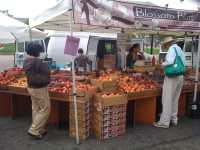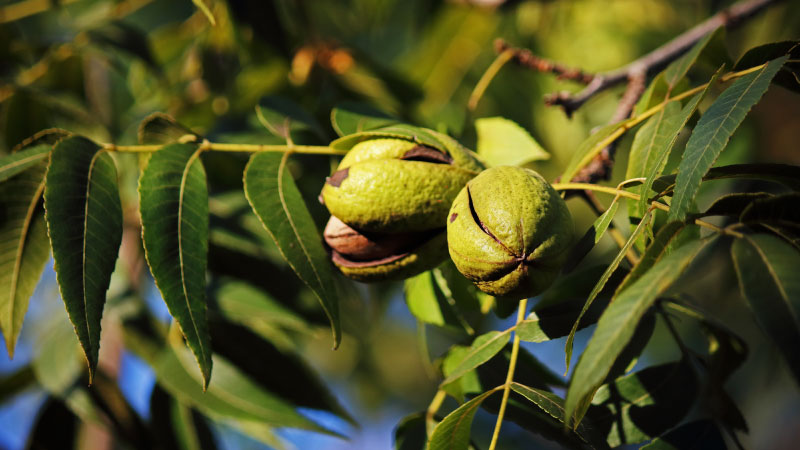Blossom Bluff Orchards Carving A Niche

Back in the 1960s, there were a dozen farms on Clayton Ave., a quiet little rural road located outside Fresno, CA. “When my mom grew up here there were lots of kids to play with,” says Bryce Loewen. “By the time I was growing up here, there were just one or two. There was still the same amount of farmland, but there were fewer and fewer houses.”
That, in a microcosm, is a brief history of tree fruit growing in the U.S. over the past generation. And it’s just as true in Wenatchee, WA, as it is on Bryce’s street in Reedley, CA. The 20-, 30-, and 40-acre farms gave way to the 200-, 300-, and 400-acre farms. (And up.) It all had to do with economies of scale. You couldn’t keep farming the same amount of acreage, and keep taking it into the same packinghouse, and expect the same income. You had to get big, or sell out to some other grower who got big.
Or you could change. Sell retail instead of wholesale. Sell organic instead of conventional. Sell only tree-ripened juicy fruit. Sell new products, such as dried fruit. Come up with a catchy name. Ditto a cool logo. Start doing agritourism. If you’re the Loewens, parents Ted and Fran, kids Renata and Bryce, that’s check, check, check, check, check, check, and check.
Diversification
It probably comes as little surprise, then, to learn Blossom Bluff Orchards — they’re located on a bluff overlooking the Kings River — had an unusual beginning. Ted Loewen grew up in the Midwest, the grandson of an apple grower. The lifestyle appealed to him, but he went to the University of California’s Hastings College of Law, and ended up practicing in Reedley. But he was living on his wife’s family farm and when her Dad got past retirement age, Ted went for it.
“What farmers do is much more comfortable for me than practicing law; I wanted to find something that was more in tune with what I am and I did,” he says. “I liked the autonomy of being self-employed, and I liked at least the illusion of control.”
Demonstrating that even niche growers sometimes need a little room to flex their muscles, when Ted took over in the early 1990s, he purchased an adjoining 30 acres for a total of 80 acres. However, they don’t farm it all. Some of the land has to be left fallow at various times because they’re strictly organic and cannot fumigate.
Currently they’re producing fruit on nearly 70 acres, 80% to 85% of that peaches, plums, nectarines, pluots, and apricots. In the fall they also grow persimmons, pomegranates, and four acres of citrus, says Bryce. They farm close to 200 varieties, because at the farmers’ markets where they sell, they want seven to 12 varieties of summer fruits to select from. Also, they try and have a full set of options, like a yellow peach and a white peach, yellow nectarine and white nectarine, etc. at all times.
Making A Connection
Most of the fruit is sold at farmers’ markets, though they do sell some to independent growers, and they have a small farm store. They sell at 11 farmers’ markets a week, most in the San Francisco Bay area but also in the Fresno area. Bryce says his mom, Fran, and sister, Renata, are heavily involved in sales. In the past five to six years they’ve dramatically increased sales to stores, but the farmers’ markets remain vital in spreading the Blossom Bluff name. “We try and have as much of a family presence as possible,” he says, “but realistically we only get to about half.”
Besides good PR, they get better sales when a family member is present. “We know the farm’s story, and of course we have more motivation to sell,” he says. “But ultimately, having the ability to tell the farm’s story, to say I grew this, is more important than the owner’s motivation. People who come to farmers’ markets don’t just come for excellent fresh produce, they want a connection with the farm. Feeling connected to the food they’re buying, or even more so, a connection with the person who grew the food they’re buying, is the key factor.”
The farm’s story, as well as its logo, is carefully tended by Bryce, who went to school to learn animation and design. He returned to the farm full-time four years ago, but has always remained involved in the farmers’ markets. He and his dad don’t have separate duties when it comes to farming, but as for the rest of the business, he says he is better at selling, Ted at finance.
They do all their own packing for their direct sales. That’s partly because they want to give it the care it deserves. “We put summer fruit into single-layer flats, not even using double layers,” he says. “At the maturity we’re picking at, we could see a lot of damage on the bottom layerof those.”
Interestingly, the first step in differentiating the farm was in selling direct. Growing organic only came later. “Selling direct is crucial for small growers. How you direct sell is also crucial,” says Bryce. “Farmers’ markets pay well but it takes a lot of work and a lot of drive time. Fresno to San Francisco is a long drive, so you have to really want to do it.”
Waste Not
One facet of the Loewens’ business, selling dried fruit, only came about because Ted Loewen is a thrifty fellow. “My dad has a problem throwing anything away,” says son Bryce, “especially good fruit.”
It seemed logical. After all, the Loewens farm in the heart of raisin country, and people have been drying fruit for many years, especially before refrigeration. The Loewens do it all naturally, putting the fruit on raisin trays in the hot San Joaquin Valley sun.
Oddly enough, it’s the one product they sell that isn’t all organic. Though you can put sulfur on an organic tree, you cannot put sulfur on fruit to dry and call it organic.
It’s really too bad because sulfuring fruit is a great way to retain the quality and flavor, says Bryce. “You lose acidity especially if you don’t sulfur,” he says. “I really wish that regulation was changed, because sulfured fruit also retains many health benefits.”
Because of that, he is doing some organic fruit with no sulfuring. Also, they don’t sulfur plums or pluots because the fruit just don’t need it. Dried plums are different from prunes, because usually prunes come from dried plums that are especially sweet. “Our dried plums also have some tart flavors,” he says.
The Loewens sell a lot of bulk dried fruit to independent grocers. They also sell it in their on-site farm shop in half-pound bags for $5 apiece, $6 through their website, BlossomBluff.com.
“There’s a lot of labor involved, but it’s well worth it because we only dry fruit that’s so over-ripe we couldn’t sell it fresh.” Bryce says. “If not for dried fruit, we would likely be composting it on the farm.”
Agritourism Can Pay
Because their little farm store is located at the
end of a dead-end street, the Loewens don’t get any street
traffic. Besides some creative signage, they had to think of
other ways to attract visitors. That’s how they began to get involved with agritourism.
A couple years ago they started doing farm tours for schools. They do a presentation on the history of farm, packing shed, and trees. It doesn’t pay the bills, but Bryce says that’s OK. “There’s a whole side of this that’s not all business for us,” he says. “We take a lot of pride in showing off what a family farm can do.”
For example, he won’t forget one group of kids, eighth graders who came up from inner city Los Angeles. “They were just amazed that essentially everything’s growing out of the ground. And they couldn’t believe there was dirt everywhere,” he says, his own amazement evident. “These kids might have seen a lemon tree before, but the association of the fruit with the soil — that farming is essentially dirty work — didn’t occur to them.”
Another group of kids came one early spring when the fruit was green. “They thought every tree was a lime tree,” he recalls. “We had to tell them that they really are peaches, and when they’re young, they are green.”
Because they do have to pay the bills, though, they are now giving paid tours, and it’s working out pretty well. They contacted the Fresno County Visitors Bureau. “We told them we’re called Blossom Bluff Orchards because we’re on a bluff overlooking the Kings River, and we’ve got a pretty great view,” he says.
Now the Visitors Bureau calls the Loewens and takes reservations. It’s mutually beneficial because the Visitors Bureau wants to show tourists the farming around Fresno. The Visitors Bureau also produces a map of farm stands called the Fresno County Fruit Trail, and Blossom Bluff Orchards appears on it.
“Agritourism is definitely something growers should consider,” he says, “but give it a lot of thought before jumping in.”









